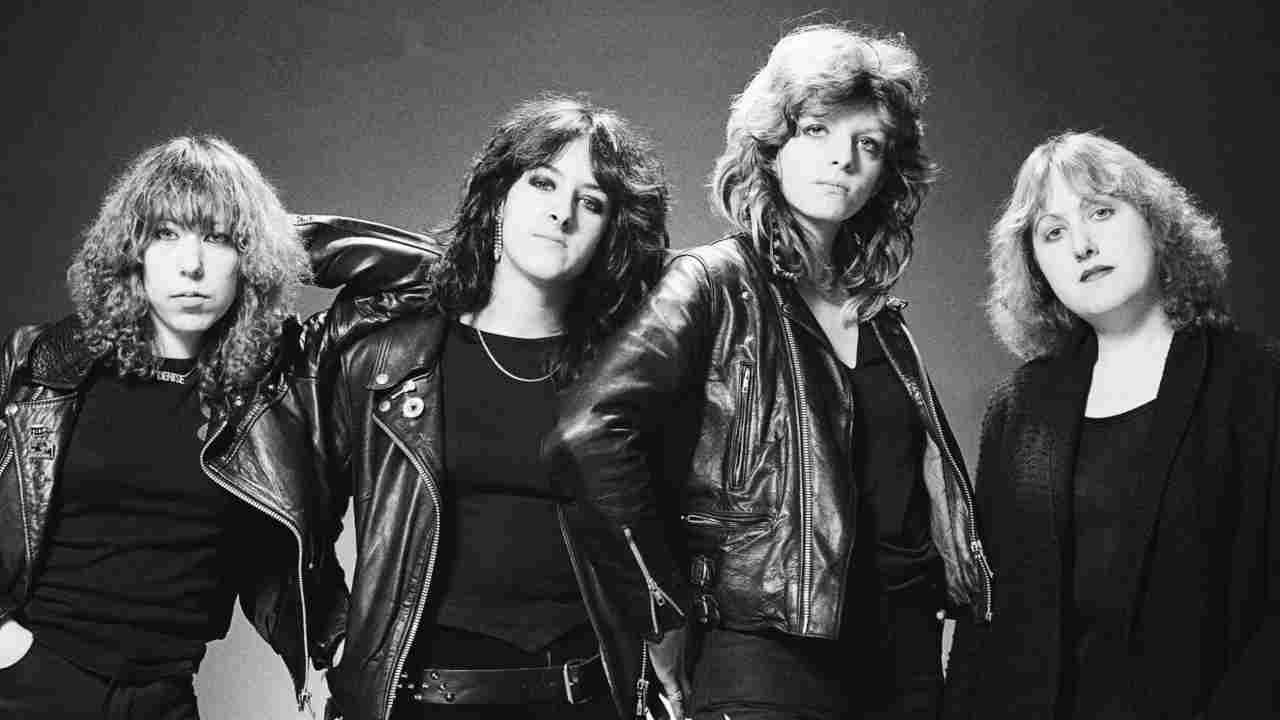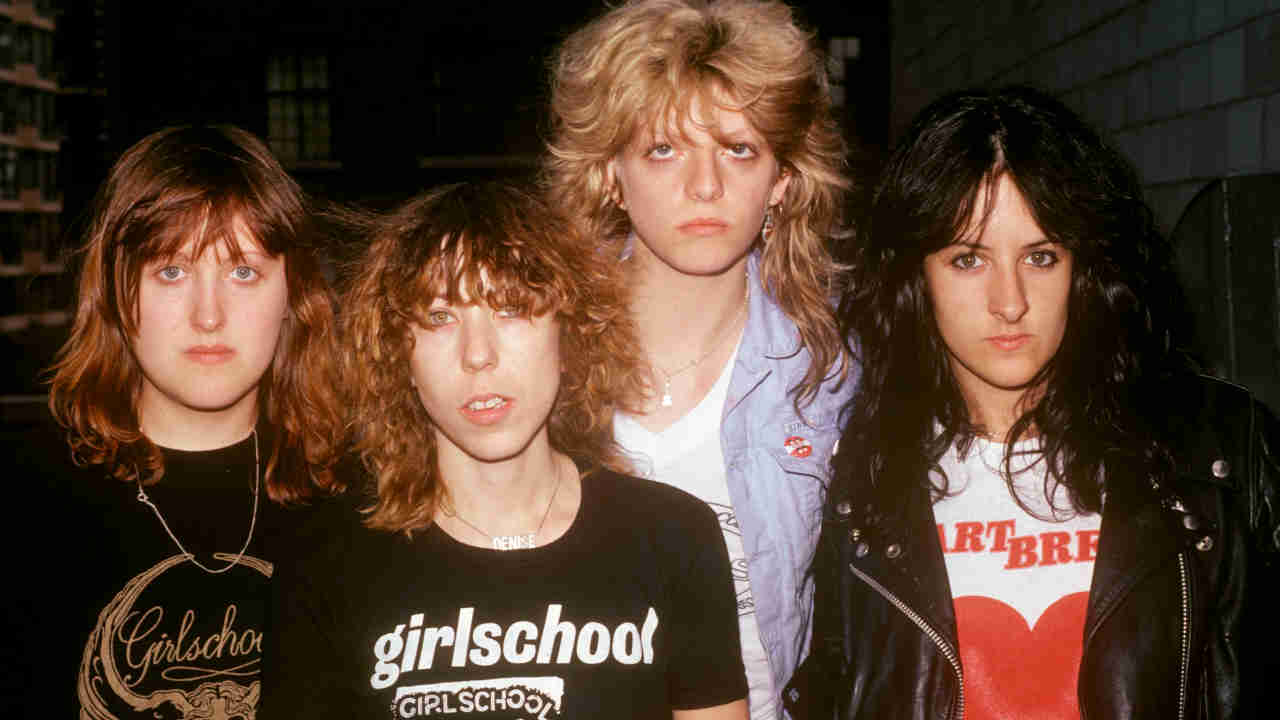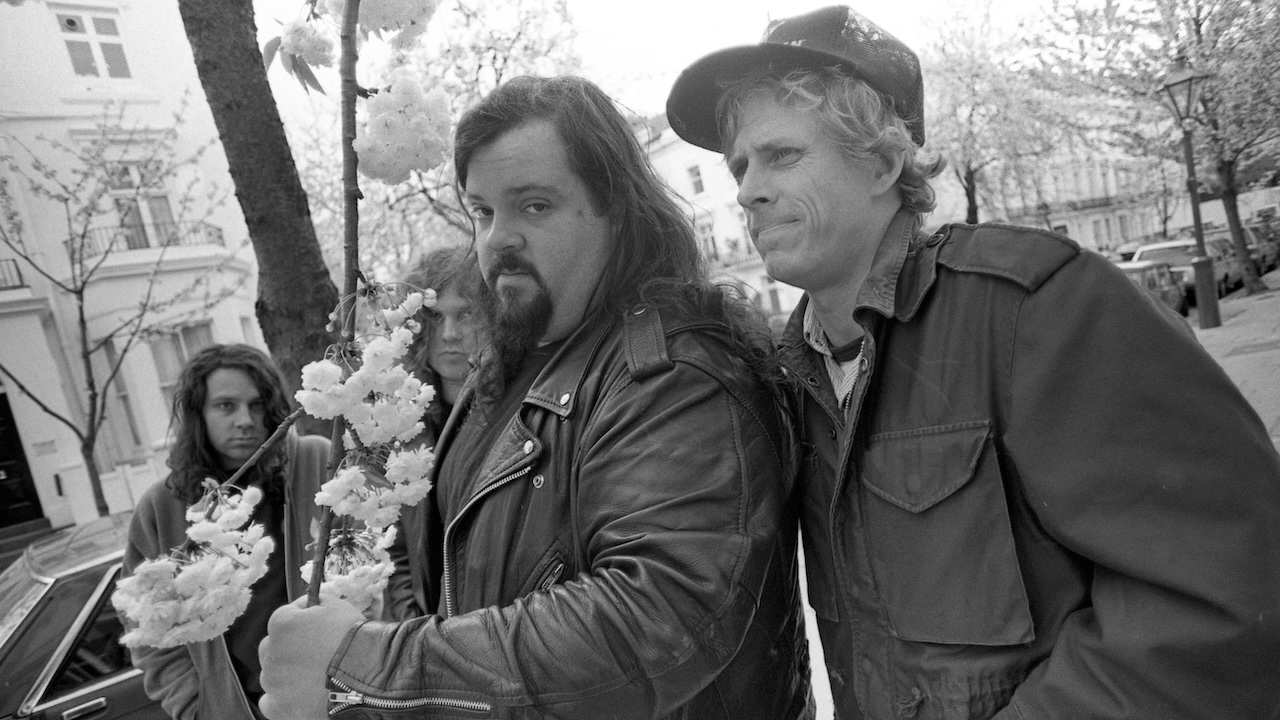Girlschool: the story of metal’s original riot girls
Lemmy loved them – and so did George Michael. This is how Girlschool kicked down the doors of metal’s boy’s club

Even by the standards of the 70s and early 80s, the New Wave Of British Heavy Metal was a bastion of ladhood. From Iron Maiden, Saxon and Venom down to such long-forgotten, semi- mythical bands as Vardis, Dedringer and Ethel The Frog, it was one giant, Spandex-clad sausage fest. The note pinned to the clubhouse door was clear: No Girls Allowed.
“Rubbish,” argues Kim McAuliffe, guitarist and singer with Girlschool. “There were a lot of boys in bands, but they never made us feel uncomfortable. We’d have kicked their arses if they did.”
More than 40 years after they formed, Girlschool don’t get enough credit for who they were and what they did. The first notable all-female metal band, they weren’t so much the antidote to the testosterone clogging up the air during that period as the sound of a band levelling the playing field. Their debut album, 1980’s Demolition, was one of the great records of the era – a blast of punk-infused heavy metal that stands toe to toe with the classics.
“They were bloody brilliant,” Motörhead guitarist Fast Eddie Clarke, whose band adopted Girlschool as their kid sisters, told Metal Hammer in 2017. “They put paid to that bollocks about ‘girls can’t rock.’ They rocked better than anybody else.”

Lloyds Bank in Wandsworth, South London, was an unlikely ground zero for a musical revolution. It was 1977, and Kim was working behind the counter and dreaming of stardom.
“I was supposed to stay on at school and do my A-levels, but I really wanted to be in a band,” she says. “My dad said, ‘I’ll lend you the money to get a guitar, but you have to get a job to pay me back.”
Then, as now, Kim was down-to-earth, unpretentious and South London through and through. She’d grown up on glam rock and Black Sabbath and Deep Purple. If they could do it, she figured, why can’t we?
Sign up below to get the latest from Metal Hammer, plus exclusive special offers, direct to your inbox!
Together with bassist and school friend Enid Williams, she formed a covers band, Painted Lady. By 1978, they’d jettisoned most of the covers and changed their name to Girlschool. “We decided we wanted to take it seriously,” she says.
The pair recruited drummer Denise Dufort and guitarist Kelly Johnson. “Kelly was one of those bloody infuriating people that everybody loved,” says Kim. “She didn’t say a bad word about anybody. She was such a joy to be with – people fell in love with her instantly.”
They made their debut at the White Lion pub in Putney, West London, in April 1978, and instantly stood out on the London pub circuit. A band featuring four women was unique at the time, though it was a result of necessity rather than design. The late 70s rock scene was hardly the most diverse or inclusive environment.
“We turned out to be a girl band because no boys wanted to play with us,” says Kim. “They didn’t want girls in the band, so the only way we could do something was to find likeminded girls. Then we realised that was quite a good thing.”
Girlschool arrived at a perfect time. Punk had taken hold, dispensing with the old order in the process and democratising music. Suddenly, you didn’t have to be a virtuoso to be in a band.
“Punk was great,” says Kim. “Anyone could get up and have a go. And some of the music was brilliant. Our favourite album for putting on before we went out was the Sex Pistols’ Never Mind The Bollocks.”
Punk wasn’t just the soundtrack to nights on the town – it was responsible for giving Girlschool a leg-up. Energised by the scene’s DIY spirit, a friend of the band had set up his own label and offered to release their debut single, the exuberant Take It All Away.
“We thought it’d be glamorous, but we ended up recording it one dingy afternoon in a basement in Soho,” laughs Kim. “We knocked it out, and as we came out into the daylight, John Peel was at the top of the stairs. He saw four bedraggled girls coming out, and we started chatting.”
Peel was an influential Radio One DJ and a champion of underground music. He began playing Take It All Away on his show, instantly raising Girlschool’s profile. One person who heard the single was Motörhead frontman Lemmy.
“Oh, Lem loved them,” said Fast Eddie Clarke. “He was into anything fast and exciting and noisy. And they could play their instruments, unlike the fucking punks.”
Kim got word that the great man himself had requested an audience with them. She got hold of a 12-inch single of the song Motörhead to see what they could expect.
“We put it on and we couldn’t believe it: ‘Bloody hell, it’s a bit like us!’ Then we saw the photo of them and went, ‘Oh god, what are they gonna be like?’ We didn’t know what to think.”
Motörhead took Girlschool under their wing, offering them the support slot on 1979’s break- through Overkill tour. But this wasn’t an example of older guys patronising a bunch of younger women – Lemmy took pains to treat the band as equals. “He had a reputation as a hellraiser,” says Kim. “And he was! But he was always an absolute gentleman to us. And he never talked down to us.”

For Girlschool, the Motörhead tour was somewhere between boot camp and a party on wheels. Their own gigs were no less intense. London was their turf – clubs like Camden’s Music Machine (now Koko) and the Bridgehouse in Canning Town, where Iron Maiden’s Steve Harris would come to check them out – but they ranged further afield, too.
“We were young, we didn’t give a damn,” says Kim. “We were driving around, sleeping on top of the gear. We had, like, a pound a day. It would be either a pint or a pie. We used to live on Bounty bars.”
Outside the van windows, the music landscape was changing. A grassroots movement was emerging, inspired equally by the superstar rock bands of the 70s and punk’s in-yer-face ethos. The music press dubbed it the New Wave Of British Heavy Metal, and Girlschool were on the frontline.
“I didn’t realise we were part of this big thing,” says Kim. “As far as we were concerned, we were just a rock band.”
In April 1980, the band recorded their debut album, Demolition, with Motörhead producer Vic Maile. With Kim, Enid and Kelly sharing vocals, it was a jolt of energy that put many of their male counterparts to shame. Their credentials were further underlined later that year when Motörhead invited them to collaborate on a cover of the classic 1959 rock’n’roll anthem, Please Don’t Touch. Lemmy and Kelly traded sneers (the pair had had what the former called “a brief affair”), while Denise sat in for Motörhead drummer Philthy Animal Taylor, who’d broken his neck just before. “That whole session was fun but crazy,” recalls Kim.
The song appeared on the St Valentine’s Day Massacre EP, released in February 1981. Credited to ‘Headgirl’, the cover featured the bands dressed as gangsters and molls. Amazingly, it reached No.5 in the singles chart, the highest position either band would attain. It also led to a memorable appearance on long-running music show Top Of The Pops. “Top Of The Pops was a goal for every band,” says Kim. “It was amazing, even for Motörhead. I remember us all in this mini-bus on the way there. And we were in make-up, with Lemmy having his quiff done, and putting on their jackets. We couldn’t quite believe it.”
The appearance elevated Girlschool to another level of fame, and brought some unlikely fans. They hob-nobbed with members of Led Zeppelin, Status Quo and Pink Floyd. A few years later, the band got to know a good-looking young man with bouffanted blond hair who drank at the same pub around the corner from their rehearsal studios.
“He’d be like, ‘Hello girls!’ whenever we walked in,” says Kim. “He was a lovely bloke. He knew us from Top Of The Pops. His name was George Michael.”
Girlschool released their second album, Hit And Run, in the spring of ’81. While it didn’t have quite the impact of its predecessor, it proved to any remaining troglodytes that an all-female band weren’t a novelty.
The following year they played America for the first time, opening for the Scorpions and their old mates Iron Maiden. The tour was a success, but it also highlighted the gulf between Maiden and the rest of the NWOBHM bands.
“You had to be there all the time to break America, like Iron Maiden,” she says. “They were there constantly. We did three and a half months with them and the Scorpions and that was hard. We didn’t really do the graft over there.”
Girlschool continued to make records throughout the 80s, even if they drifted towards a more mainstream rock sound. But breakthrough success eluded them.
“They deserved to be as big as any of the other blokey bands,” said Fast Eddie Clarke. “But I just think you can only have a few bands in any scene that make it big time. It’s the luck of the draw.”
Not that Kim herself seems overly concerned. “Perhaps we didn’t take it seriously enough,” she says. “We were just there to have a good time.”
It’s a motto that’s served Girlschool well over the past 40 years. They’ve put out a steady stream of albums and, give or take a few line-up changes and the odd extended break, never actually split up. Sadly, Kelly died of cancer in 2007, though her bandmates paid tribute to her by shaking her ashes, maracas-style, on the track Everything’s The Same from the following year’s Legacy album. “She wanted to make a guest appearance.” says Kim. “She made a ghost appearance instead.”
More than 40 years after they emerged, Girlschool are still going strong, even if they’ve never truly been enough credit. Maybe they’ll finally get the recognition they deserve as a genuinely groundbreaking band.
“I suppose you could argue that,” says Kim. “But that’s not why we got into it. We just wanted to make a bloody racket. Nobody treated us any differently because we were women. We were just one of the lads, really.”
Dave Everley has been writing about and occasionally humming along to music since the early 90s. During that time, he has been Deputy Editor on Kerrang! and Classic Rock, Associate Editor on Q magazine and staff writer/tea boy on Raw, not necessarily in that order. He has written for Metal Hammer, Louder, Prog, the Observer, Select, Mojo, the Evening Standard and the totally legendary Ultrakill. He is still waiting for Billy Gibbons to send him a bottle of hot sauce he was promised several years ago.

